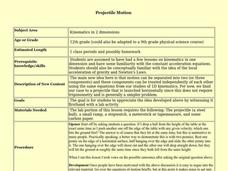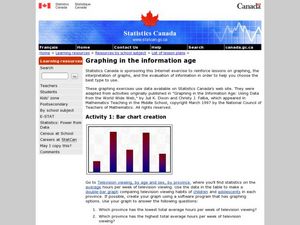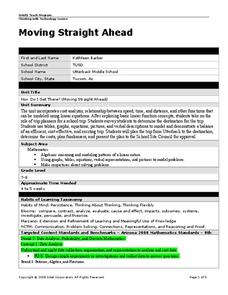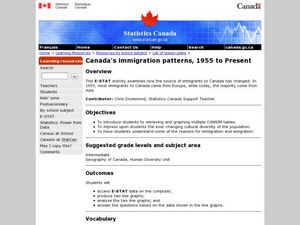Curated OER
Wildlife Sampling-Capture-Recapture
Seventh graders simulate the capture-recapture method of population sampling using beans. In this biology lesson, 7th graders calculate the total population of beans in the bowl. They assess whether this method is reliable or not.
Curated OER
You Can Do It: Creating How-To Videos
Students create instructional videos. in this video lesson, students choose a subject area and topic to make their own how-to video. They research this topic and film their video using a flip-camera.
Curated OER
Columbus Day-Activity Center
Students participate in various Columbus Day activities. In this holiday lesson, students construct paper boats and read various books about Columbus. Students are shown an educational video about Columbus to reinforce factual information.
Curated OER
How does Your Province Stack Up?
Students investigate data about age, and sex of a population. In this statistics lesson, students are given data on a population to analyze and compare to other provinces. This assignment is part of a geography lesson and requires 3...
Curated OER
George and Sam Save for a Present
Third graders develop their algebraic thinking by recognizing a variety of patterns using concrete objects, numbers, tables, and pictures. In this George and Sam Save for a present lesson, 3rd graders communicate their mathematical...
Curated OER
Chew on This
Eighth graders explore and demonstrate the seven steps of the scientific method. They predict how much sugar is in chewing gum and test, analyze, and calculate the sugar content of gum.
Curated OER
Dynamic River Model
Students develop the concepts of flood stage, levees, floodplain, and the dynamics of river flooding. They construct river models and test various flow rates and volumes. This lesson has an excellent experiment for students to do.
Curated OER
Create and Analyze Rectangular Patterns
Students explore the concept of geometric patterns. In this geometric pattern lesson, students use Microsoft Excel to explore geometric patterns. Students analyze growth rates of pattern growth. Students create their own patterns and...
Curated OER
Collect Your Own DNA
Young scholars examine DNA and its location throughout the body. In this DNA instructional activity students collect and observe their own DNA and see that DNA can be extracted from any cell in the body.
Curated OER
Pump It Up
Students study the anatomy and functions of a heart. For this heart study lesson, students read a book about the heart and study a plaster heart model. Students take their own pulse in various stages of rest as well as active...
Curated OER
Decode Word Is..
Students solve problems using patterns. In this algebra activity, students identify the relation, domain and range of a function. They graph functions using coordinate pairs.
Curated OER
Projectile Motion
Twelfth graders experiment with a projectile that is launched horizontally after a demonstration and small discussion about two pennies, one dropping from a table top and the other being slide off the top and hitting the ground at about...
Curated OER
Canada's Climate: Temperature and Rainfall Variations
Students analyze data about various climates in Canada. In this data analysis and climate lesson, students use Canada Year Book 1999 to complete a worksheet and make connections between precipitation and temperature in different climates.
Curated OER
Graphing in the Information Age
Students create a variety of graphs based on population data. In this statistics instructional activity, students use data that can be gathered on-line to make a bar chart, line graph, and circle graph.
Curated OER
Moving Straight Ahead
Young scholars analyze the relationship between speed, time and distance. In this math lesson, students plan a school trip. Young scholars determine the efficiency and cost effectiveness of a trip.
Curated OER
The Cost of Raising a Child
Students study the cost of raising students based on different geographic locations and income levels. They study tables from the USDA and listen to audio tapes.
Curated OER
Getting Familiar with Fractals
Young scholars use the Internet to answer lab questions about fractals, and then construct fractals using the initial stage and iteration rule. They complete tables and generate rules for the "nth" term and create their own fractals.
Alabama Learning Exchange
Graphing Stations
Pupils explore the concept of graphing stations. In this graphing stations lesson plan, students head to various teacher set-up stations involving slope, point-slope, standard form, parallel lines, etc. Pupils work problems at each...
Curated OER
Analysis of Colonial History: Shipbuilding in Nova Scotia, 1861
Eighth graders use a web-site to examine the economic factors involving colonial ship- building. In this shipbuilding lesson, 8th graders will build a set of tables that demonstrate how they have chosen to analyze cost, processing and...
Curated OER
Canada's Immigration patterns: 1950 to Present
Students examine the changing immigration pattern of Canada. In this immigration lesson, students use statistical data from a web-site to complete a worksheet and graph their findings.
Curated OER
Plotting Slave Population Density in Connecticut in the 1700's
Tenth graders explore slavery in the U.S. by researching the web. In this U.S. history lesson, 10th graders identify the geography of Connecticut and the overall involvement the state had in the slavery process. Students view data of the...
Curated OER
Compare 2-D Shapes
Second graders examine the attributes of two-dimensional shapes. In this geometry lesson, 2nd graders play a game in order to identify two-dimensional shapes and to name them.
Curated OER
Compare 2-D Shapes
Second graders explore and analyze plane shapes. In this plane shapes lesson, 2nd graders evaluate shape attributes to classify shapes correctly. Students work in groups to create different shapes.
Curated OER
How Does Flowing Water Shape a Planet's Surface?
Students investigate how flowing water influence landforms. In this earth science lesson, students observe water behavior as it flows from the stream table at various inclinations. They discuss whether water shaped Mars landforms or not.

























